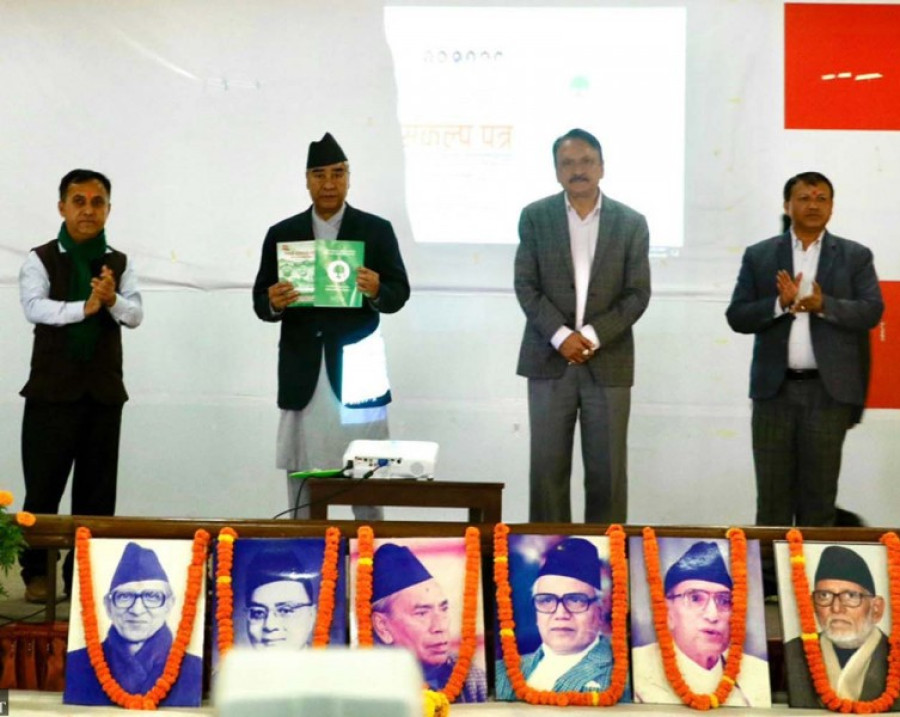Columns
Diminishing appeal of Nepali Congress
Today, many factions have emerged within the party, each harbouring distinct characteristics.
Sambridh Ghimire
In the intricate tapestry of Nepali politics, the Nepali Congress has long played a pivotal role as a symbol of resilience, noble ideals, and an ever-evolving spirit of democracy. Like a riveting English novel chapter, the Nepali Congress weaves a narrative of arduous struggle, sacrificial valour, and unwavering determination, leaving a mark on the nation’s history. From the perspective of an ardent nationalist, the Nepali Congress emerges as a gallant knight battling against the forces of autocracy and oppression. Its origins can be traced back to the crucible of liberation, where a collective yearning for emancipation from despotism ignited a flame that would guide the party’s journey for decades. As a result, the pages of its chronicle unfurl to reveal chapters adorned with heroic figures who defied tyranny and championed the noble principles of liberty, equality, and justice.
In recent years, the Nepali Congress has faced a period of introspection and uncertainty. Emerging political players and shifting dynamics have challenged its once unassailable position as a driving force in shaping the nation’s destiny. The battles fought with unwavering conviction have given way to fatigue as disillusionment and doubt cast shadows over the party’s future. The fading influence and eroding glory of the Nepali Congress cast a sombre shadow over the political landscape.
Veil of division
Throughout its history, the Nepali Congress has been propelled by towering figures such as Matrika Prasad Koirala, Bisheshwar Prasad Koirala, Surbarna Shumsher, Ganesh Man Singh and Krishna Prasad Bhattarai—stalwarts who carried the torch of resistance through tempestuous times. Their unwavering determination and leadership set the stage for a legacy of power, ambition, and progress. But the Nepali Congress has experienced its fair share of internal divisions, power struggles, and clashes of personalities. The party’s leaders have sparred, manoeuvred and competed for influence and control. While emblematic of the complexities of politics, these clashes have also posed significant obstacles to the party’s unity and collective vision.
In the early days of its formation, the founding fathers had limited confidence in one another. Their diverse personalities, ideologies and ambitions created doubt and scepticism. However, driven by their shared vision, they gradually developed fragile alliances and nurtured trust. Their journey highlights the power of perseverance, collaboration and a collective commitment to a greater cause. Unfortunately, as time passed, the factions within the party grew more profound and entrenched, casting a shadow over the once fragile unity of the founding fathers.
Today, many factions have emerged within the party, each harbouring distinct characteristics and exerting their influence in far from admirable ways. These factions include the caucus, a conniving group that aligns solely to further their self-serving objectives. They manipulate their collective power to push through their agenda, disregarding the greater good of the party.
Slinking in the shadows, the cartel thrives on secrecy and manipulation, using its underhanded tactics to tighten its grip on power. Their sole focus is protecting their vested interests, even at the expense of the party’s integrity and principles. Their actions epitomise the darkest side of political manoeuvring, devoid of genuine concern for the party’s welfare.
The coterie, entangled in their webs of personal alliances and hidden agendas, exploit their relationships to consolidate their influence within the party. Their motives are driven by self-interest, blurring the line between loyalty and opportunism. Their unity serves as a facade, concealing their true intentions and undermining the party's unity and cohesion. Wrapped within their impenetrable cocoon, they seek shelter from dissenting voices and alternative perspectives. Their insular approach creates an echo chamber where critical thinking and adaptability are stifled. Moreover, they prioritise their comfort over the party’s growth, resulting in stagnation that hampers progress and hinders necessary change.
Finally, they manipulate the party from the shadows. They engage in covert activities, employing unscrupulous tactics to advance their ambitions, irrespective of the consequences. Transparency and accountability are foreign to them as they orchestrate backroom deals and use Machiavellian strategies to satisfy their selfish desires.
These factions, with their devious machinations and disregard for the party’s welfare, inject toxicity into the fabric of politics. Their presence undermines trust, sows division, and corrupts the noble principles founded by the party. The negative impact of these factions threatens the party’s credibility, unity and ability to serve the people effectively.
State of grief
In the wake of the unexpected election outcome and the subsequent surprising by-election results, a sense of collective grief seems to have settled upon the Nepali Congress. Like mourners grappling with profound loss, the party navigates a complex emotional landscape marked by shock, disbelief, and profound sorrow.
Within the party, the dynamics of grief manifest in various factions and individuals, each responding uniquely to the recent election outcomes. At the heart of this intricate web of emotions, the cabal leadership, representing the establishment faction, is trapped in denial. Faced with unexpected results, they cling to the belief that the by-election was merely an anomaly, refusing to acknowledge the need for introspection and change. In stark contrast, the general secretaries, driven by a simmering anger against the establishment, embody a stage of righteous indignation. Their frustration and dissatisfaction fuel a fiery determination to challenge the status quo and demand accountability.
Meanwhile, other faction leaders navigate the grieving process through the lens of bargaining. Aware of the decline of the party's influence, they seek to leverage their positions and manoeuvre their way into the corridors of power, hoping to secure their interests within the shifting political landscape.
At the grassroots level, the dedicated workers who form the party’s backbone are engulfed in a deep depression. The state of affairs within the party and the uncertain future have taken a toll on their morale and dedication. As a result, they grapple with a sense of disillusionment, questioning their roles and the effectiveness of their efforts. However, outside the party, the voters have come to accept the steady decline of the Nepali Congress and are resigned to the idea of seeking alternatives. Moreover, they have recognised that the party’s internal strife and its inability to adapt to changing times have diminished its appeal.
So let us embrace the scepticism but also hold onto a glimmer of hope, for it is in the face of uncertainty that actual transformations can occur. Only time will tell whether the Nepali Congress has the power to reshape its narrative, overcome challenges and find its rightful place in the ever-evolving political landscape.




 13.12°C Kathmandu
13.12°C Kathmandu















